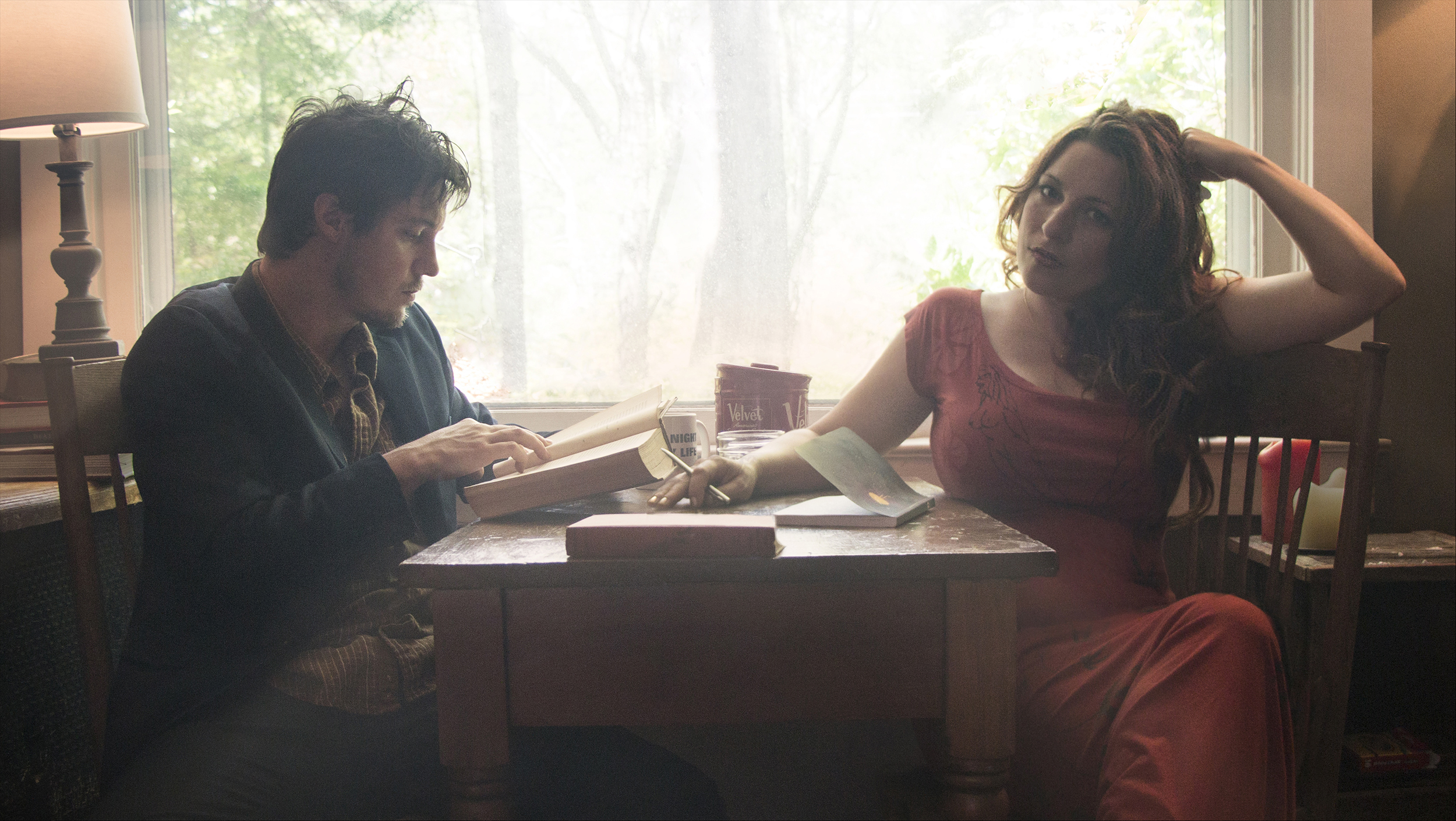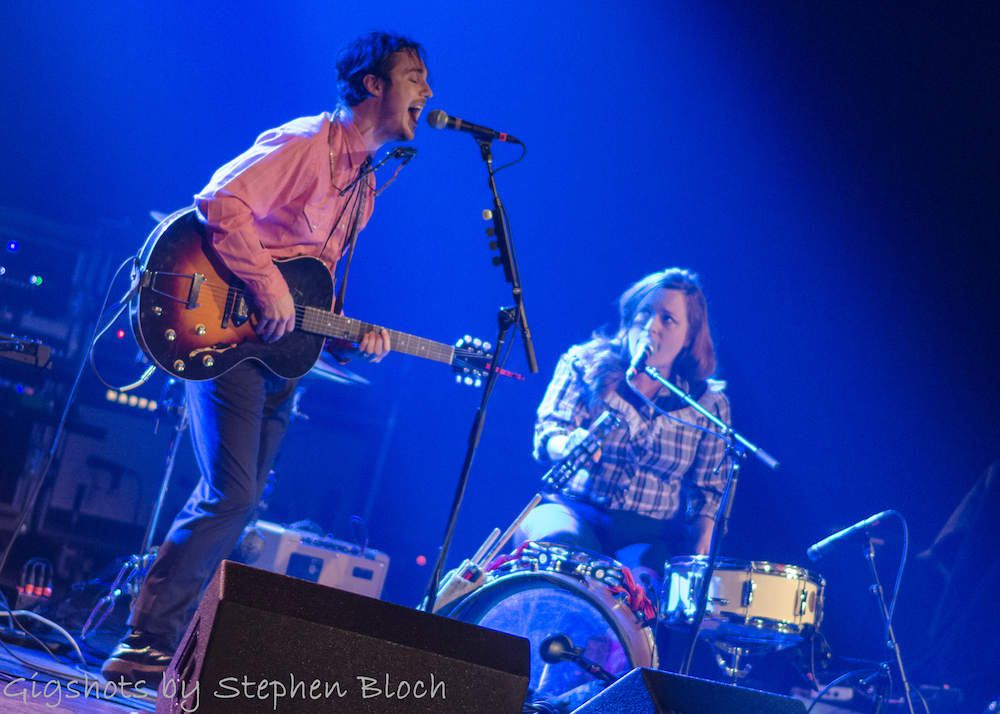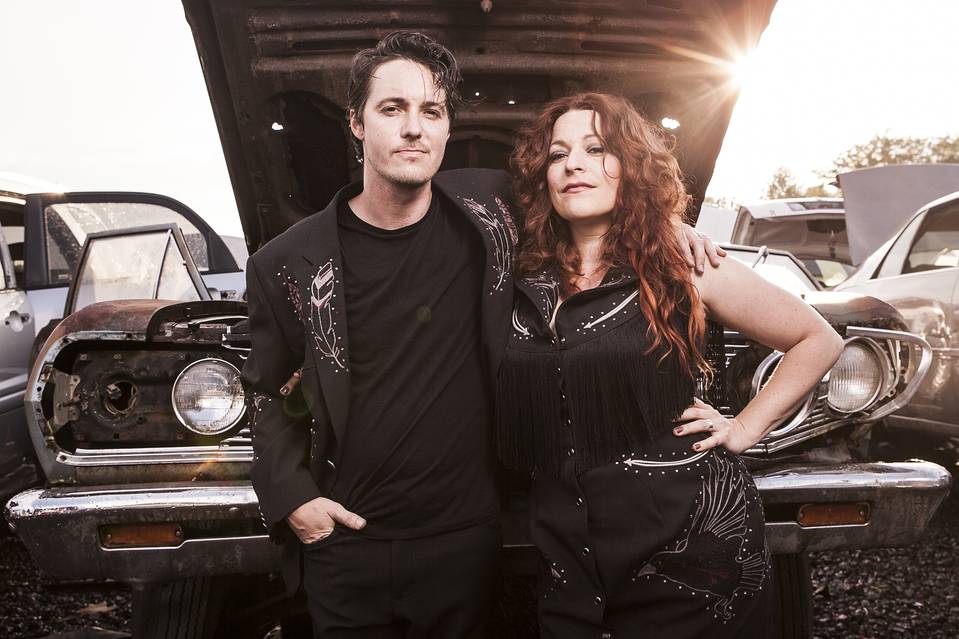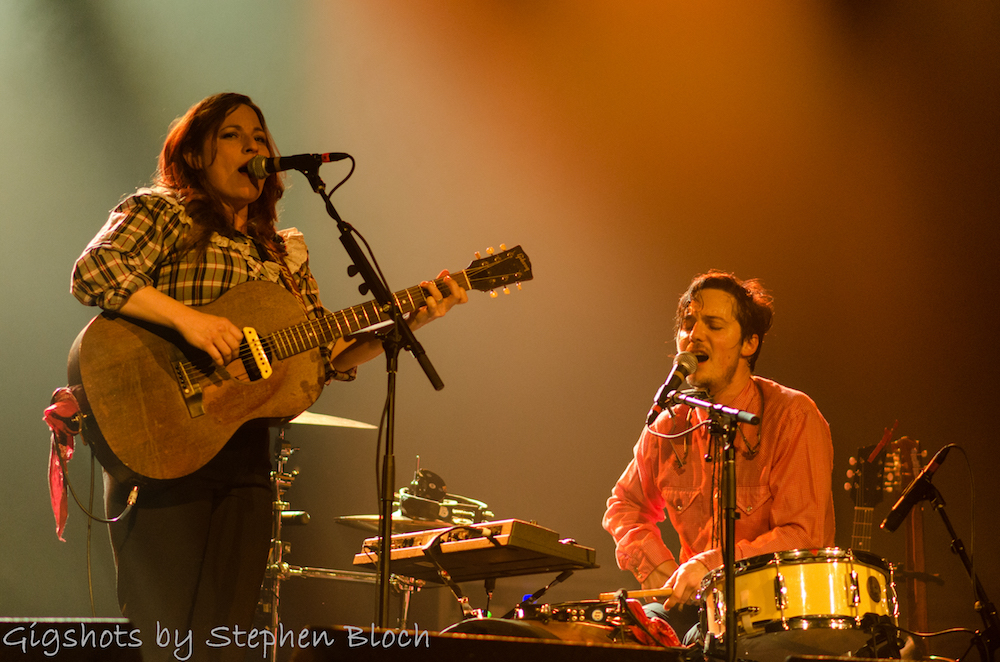Shovels & Rope: Southern Storytellers

It’s a little after 9 p.m. on a Friday in late July, and Cary Ann Hearst and her husband Michael Trent are about to take the stage as part of a Newport Folk Festival late-night show, a benefit for the Boys & Girls Club, and presented by Frye. The couple, who create music together as Shovels & Rope, have dubbed the night “Busted Jukebox.” Their set is stacked with numerous covers and special guests that feel in line with the weekend’s collaborative feel.
Though Shovels & Rope keep their newest material in their back pocket on this night, they’ve also started the rollout for their latest full-length, Little Seeds, which arrives next month. A change of pace from their traditional character sketches, this album is deeply personal and emotional. Its songs touch on a number of recent events in their lives— from learning of Hearst’s pregnancy to caring for Trent’s ailing father, losing loved ones, traveling the country and working together in a family band.
The husband-and-wife duo fill Rhode Island’s Jane Pickens Theater & Event Center with their Americana folk-rock as they offer takes on other people’s songs, like “Blue Eyes Crying in the Rain,” “El Paso” and “The Wayfaring Stranger”—with a little help from their friends John Moreland, Hayes Carll, Matt Vasquez, Jonny Fritz, Margo Price and Lucius. (They would later return the favor, playing with Vasquez’s band Middle Brother during their set on the festival grounds at Fort Adams State Park. “We’re sitting in with them [on Sunday], so we’re actually cramming their lyrics,” says Trent.)
Shovels & Rope also cover a song from Trent’s former band The Films (“Fingernails for Breakfast”), play “Leaving Louisiana in the Broad Daylight” as “just us” and bring the whole ensemble out for the sing-along “Peace, Love and Understanding.”
Hearst, wearing a black dress with a white floral pattern, sets up shop behind her trademark “junkyard drum kit” and Trent, donning a black suit, moves from guitar to harmonica to piano throughout the evening.
The classic theater personifies the Newport Folk Festival’s distinctly Americana vibe, with its wooden stage, exposed brick backdrop and two eagle statues flanking the top of the stage, framed by a weathered yellow curtain. (The festival’s logo features an eagle carrying a guitar in its talons, surrounded by stars and nautical rope.) The lone decoration perched on Trent’s wood-encased upright piano: lime green lamp with an exposed bulb, sans shade.
Their stage, like the drum kit and the evening itself, seems refreshingly cobbled together in the moment. In fact, the band has spent the entire day rehearsing the material and playing these songs for the first time together with the guest musicians. It adds to the authenticity and rustic feel of the event, and the camaraderie and humble nature of the artists are palpable—you can tell it’s just a jam session among friends.
Last year’s Busted Jukebox album was the impetus for the evening’s show, which Hearst refers to as a “recreation album” and Trent calls a “recording experiment.”
“We were just playing with arrangements and it was the kind of album where we got to be as creative as we wanted to and reinterpret songs, just go o the deep end as much as we wanted to, and nobody knew it was coming. There were no expectations,” he says.
“I always think it’s good for your writing fashion to spend time with the tunes that you love and that wasn’t our intention, but I’m sure it made us a little bit better as musicians,” Hearst adds of channeling other material.
The show ends with a mix of musicians and Newport Folk staff members huddling onstage together. Adding to that family vibe, the back row of the theater includes a few Southern friends who traveled to Rhode Island to enjoy the unique and intimate show. 
“We’re kind of still blown out from the other night,” Trent says after the Busted Jukebox show, laughing, and adding that they have been drinking lots of coffee as of late. “It was a lot of preparation to do on the road—but it was fun.”
They echo this creative spirit, sense of collaboration and hard-working ethos in their 2012 hit song “Birmingham,” as the lyrics “It ain’t what you got, it’s what you make” seem to be somewhat of a through line for Shovels & Rope.
Hearst and Trent met in the early ‘00s when their bands opened for Jump Little Children at Athens’ Georgia Theatre and “were friends for years before starting to play together and then played together for several years before starting to tour together.” Both of their fathers were mandolin players with bluegrass backgrounds, “so we both grew up jamming with our dads,” Hearst says. “Mike started out in rock-and-roll bands [notably, The Films] and I was a young Tennessee porch-picker.”
The Films relocated to Charleston, S.C., because it was easier to tour out of the Southeast than Colorado. Hearst had attended College of Charleston and never left the Holy City, sticking around to play in bands and bars. The couple released their first record together, Shovels & Rope, under their individual names in 2008.
She says that the South continues to inform their story, language and turn of phrase.
“It’s complicated living in the South because the baggage is so heavy, but the future is bright,” Hearst says as she describes the Lowcountry’s beautiful and colorful landscape. “[Touring] lends itself to waxing poetic about home, which, in our case, means live oaks, Spanish moss, salty air, fecund and smelly marshland, briney oysters, friends who farm, clucking hens, land-wealthy rednecks, degenerate sons of blue-blood Charleston families, bonfires, fine restaurants, the threat of hurricanes and rising seas. Musically, it’s not the geography as much as the topography of the American musical landscape that informs what we try to do. We find the stuff we like the feel of from wherever it comes from.”
In addition to Southern culture and the waterways of Charleston, their lyrics namecheck Saugerties, N.Y., and Harvard Square, Mississippi and Bakersfield, Calif., the Chesapeake and New York’s BQE. Shovels & Rope’s music feels truly Americana—the open road and U.S. landscape seep into their music.
“We see a lot of the country because we’re on the road all the time, so it can’t help but just sneak in there—we definitely appreciate it and we’re lucky enough to see a lot of America,” Trent says. “It’s inspiring and we get to meet all these different kind of people that will round you out, in a good way.”
The Band is another touchstone for Hearst and Trent, specifically Garth Hudson, whom they pay tribute to on Little Seeds with “The Last Hawk.”
“It goes without saying that there’s no more definitive folk, Americana band than the Canadians from The Band,” Hearst says with a laugh. “And we’ve been huge fans of Levon and his personality. That song is a tribute to Garth Hudson— we had read a Rolling Stone article where Garth looked back on the experience of The Basement Tapes and working with Bob Dylan during those early years. We were marveling about what amounted to the practice session of these cherished, magical recordings. Nobody can recreate that and Garth had set up recording equipment, not considering that anyone would hear it. We were remembering how much we loved that music.”

Since our initial meeting at the Relix office in 2012, while Shovels & Rope were promoting O’ Be Joyful, the band has garnered numerous accolades and accomplished so much. They won the Emerging Artist of the Year and Song of the Year awards at the Americana Honors & Awards in 2013, were the subject of an award-winning documentary film by The Moving Picture Boys called The Ballad of Shovels and Rope, performed at NYC’s Lincoln Center as part of the “Great American Songbook” series, and have made TV appearances and performed at nearly every major U.S. festival.
Now, they offer Little Seeds, their most personal and powerful album to date. Though this 13-track collection still has a few of their signature Southern Gothic-inspired tales (namely a song titled “Botched Execution” and a Civil War battle story, “Missionary Ridge”), it’s mostly a raw, candid and creative take on their own ups and downs of the past few years.
“We were just trying to write honest material, and we have done a lot of character-based songwriting in the past— that’s just sort of something we like to do—but there was a lot going on in our lives while writing this album and it just ended up being more personal than I feel like we usually are,” says Trent.
While working on the record, Hearst learned that she was pregnant, and Trent’s parents were also living with the couple at the time. “Mourning Song” and “Invisible Man” were both inspired by caring for Trent’s dad, who has Alzheimer’s. They beautifully capture what it’s like for someone living with this debilitating disease, and provide a thoughtful perspective from a loved one struggling with it, particularly through the lines: “I put on my headphones and I remember that sound…” and “I hate to repeat it, but it’s not my choice.”
“Most people know somebody who is dealing with it. As people age, it seems it’s more prevalent and, with everything going on around us, it was hard not to reflect on that topic. So that definitely played onto our record on more than one occasion,” Hearst says. “It’s an epidemic and it’s heartbreaking, but it’s also something that gets talked about within the family, but it’s not a national conversation. So if we have contributed something positive to the national conversation, that would be good.”
They also reference the universal and emotional topics of violence, racial divides and unity on “BWYR,” a powerful spoken-word track that they wrote after learning of the mass shooting at Charleston’s “Mother Emanuel” AME Church in June 2015.
“It was an emotional purging exercise. We were on the road—a lot of our friends were grieving and we couldn’t be with them. It was written more as a poem, not really with an intention of sharing at the beginning. It was born onto paper at that moment and we had made a quick recording of it on the phone,” Trent says. “With such a personal thing, it was hard to imagine putting it out there. Then, at one point, our manager and friend, Paul Bannister, was listening to the roughs and he stumbled on it, was moved by it and encouraged us to put it on the record.”
 Hearst notes that they decided to use the song on Little Seeds in an effort to help bring attention to the senseless violence sweeping the country. “It’s escalating in a terrifying, heartbreaking way and we’re all saddened by that. There are such small ways to stand up and say something. Good people can’t sit around and not say anything and hope that it all works out. Michael and I are just humble bums but we can try to voice the feelings that we feel, and that the people we know and love feel, and address the national pain. I learned the word ‘didactic’ recently, and so we don’t want to do it in a preachy, self-righteous way, but in a genuine way. We’re like everyone else, and we’re also new parents, so there’s a whole lot more at stake. That’s why we’re actively putting it on the record and that’s our statement about it.”
Hearst notes that they decided to use the song on Little Seeds in an effort to help bring attention to the senseless violence sweeping the country. “It’s escalating in a terrifying, heartbreaking way and we’re all saddened by that. There are such small ways to stand up and say something. Good people can’t sit around and not say anything and hope that it all works out. Michael and I are just humble bums but we can try to voice the feelings that we feel, and that the people we know and love feel, and address the national pain. I learned the word ‘didactic’ recently, and so we don’t want to do it in a preachy, self-righteous way, but in a genuine way. We’re like everyone else, and we’re also new parents, so there’s a whole lot more at stake. That’s why we’re actively putting it on the record and that’s our statement about it.”
They also honor their close friend and fellow musician Eric Brantley, who was fatally shot last year, with Little Seeds’ final two tracks: an audio recording of his mother describing his birth in the back of a police car (“Eric’s Birthday”) as well as a moving tribute to his life (“This Ride”).
“It was just the most horrible thing. We had a memorial a couple days after—a private, small gathering—and people shared stories and laughed and cried and just grieved together in a physical way,” Trent says. “His mom shared that story and it was such a beautiful moment and endearing, and people were smiling about him and that story because, if you knew him, of course he was born in a police car, you know?”
“Not that he was ever a criminal,” laughs Hearst. “He was just an awesome dude who worked out of our garage on motorcycles and I’m happy we can share those memories of his character.” Trent recorded Eric’s mother telling the story on his phone and was initially skeptical to share it with others because it was so personal. “It was very kind of her and so cool that she would do that,” he adds. “It really meant something to us and to our friends, and there’s universal sentiment in there as well. We wanted to do right by him and put something out in the world that is dedicated in his memory.”
Trent and Hearst make their home on Johns Island, S.C., a quiet, coastal community just over the Ashley and Stono Rivers on the outskirts of Charleston. Last September, they welcomed a daughter, Louisiana Jean, who joins their dog, Townes Van Zandt, to round out the family. Parenthood has had a positive impact on Shovels & Rope’s writing and recording process; it’s helped them understand the value of teamwork and the true meaning of their partnership.
“There’s a lot of scheduling going on. We make all of our records at home—our studio is in our house, so we just really have to team up. We’ve always been a tight team and we balance each other out pretty well, but we really had to get real with it—we needed each other a lot during this time,” Trent says. “Whether it be emotionally or just, ‘You need to do this physical task right now because there’s no way I can do this.’ Or, ‘You need to finish this song because there’s no way I can finish it.’ It was very real.”
“It was a new level of collaboration,” Hearst adds with her trademark chuckle. (After their daughter’s birth, they joked in a Facebook post: “Like most of our endeavors, she was made at home out of a few things we had lying around.” And they posted a new lullaby on SoundCloud, “Hush Little Rocker,” to celebrate the occasion.)
Along the way, Hearst and Trent have become closer as a couple, and more intimate writing partners. They reference being in both a personal and professional relationship on “Buffalo Nickel,” and finding that balance of working with someone who is also your spouse.
“I think that we have found [that balance],” Hearst says with a laugh, mentioning that she’s a little bit sunburned, as she and Trent look out at the tall ships and sailboats on the Narragansett Bay beyond Fort Adams State Park.
While discussing dividing the workload, she also notes that the songwriting intensified with this record, and that she doesn’t know how two people could be closer than her and Trent. While a lot of this was part of their normal process of working together on a list of ideas, with some of Little Seeds, she says, the ideas were born mutually.
“We’d rally and collaborate and we were writing like one person. We were trying to write a story and shape the song and, then, the narrative became about us trying to write the song, and the struggle and cooperation that was taking place,” Hearst says. “We were laughing at ourselves when it was done. It was like, holding a mirror up to us, so yeah, our songwriting process has changed in a good way.”




















